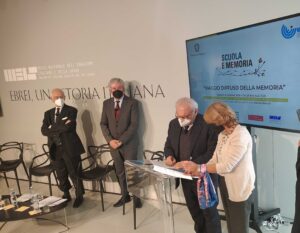An itinerary by train across Italy in memory of deportations
 “Today we begin a journey that starts at Fossoli, will touch Milan, Rome, San Sabba in Trieste, and will end in Ferrara at the MEIS – National Museum of Italian Judaism and the Shoah, to give the sense that this is a history that also concerns Italy as a whole, both as victims and as executioners. It is a journey into the pain but also the resurrection of our country”. So the Italian Minister of Education Patrizio Bianchi explained the meaning of this itinerary of Memory, organized in the wake of Holocaust Remembrance Day by the ministry, together with the Union of the Italian Jewish Communities.
“Today we begin a journey that starts at Fossoli, will touch Milan, Rome, San Sabba in Trieste, and will end in Ferrara at the MEIS – National Museum of Italian Judaism and the Shoah, to give the sense that this is a history that also concerns Italy as a whole, both as victims and as executioners. It is a journey into the pain but also the resurrection of our country”. So the Italian Minister of Education Patrizio Bianchi explained the meaning of this itinerary of Memory, organized in the wake of Holocaust Remembrance Day by the ministry, together with the Union of the Italian Jewish Communities.
The journey has many stops so as to create a worthwhile alternative to the visit to Auschwitz (impossible due to the health situation) and involves four Italian locations deeply marked by the tragedy of Nazifascist persecution: the internment camp of Fossoli in Emilia-Romagna; the Tiburtina train station in Rome, from where more than one thousand Roman Jews rounded up on 16 October 1943 were deported to death camps, the Memorial of the Shoah in Milan, and the MEIS in Ferrara. The students, from many Italian schools, will be accompanied by testimonies of Holocaust survivors or their children, with the historian Marcello Pezzetti providing the context for these painful events. Here the online presentation.
“We who today are here and in the other train stations, take responsibility for the Memory. It is a concrete, precise, heavy, and tiring challenge and only together can we face it”, remarked UCEI President Noemi Di Segni from Fossoli, recalling the need to act, through the judiciary and the legislation, against those who once again abuse with persecution symbols, as recently happened in Perugia and other Italian cities. Together with the minister, Di Segni then signed the Memorandum, renewed every year, dedicated to the work on Memory in Italian schools.
This time the document was signed also between the ministry and the MEIS. “This is the occasion in which the vivid memory of what happened must be sustained by an ideal to be carried forward not only on 27 January but on each day of the year: the commitment to fight against all forms of racism, antisemitism, and intolerance, phenomena that unfortunately are re-emerging with increasing virulence throughout the world”, stressed MEIS President Dario Disegni.
Disegni recalled the role of the MEIS in building awareness of the role of Jews in Italian society and of how racist laws and persecution represented a betrayal of Italy towards its citizens. That betrayal also affected other territories under the control of the regime such as Libya, recalled the president of the Jewish Community of Ferrara Fortunato Arbib. In his speech, he recalled both his past fears in Libya, even after WWII, and his present hopes. “The memory of the ancient splendor of our Jewish community in Ferrara and the values preserved until today is an added value for the city”, he said.
The stop at the Tiburtina train station in Rome was marked by the testimonies of Holocaust survivors Edith Bruck and Sami Modiano. “Witnessing is a moral duty. I’ve always done it, from the first moment. Living the Memory every day: something that is not for me, but for others. All racisms are nefarious, they all affect us closely”, said the writer and poet, retracing the history of her deportation from Hungary and stressing the meaning of her commitment today. “A survivor is different from other people: he has his nightmares, his depressions, his silences. I do it for the youth, whom I love a lot”, said Sami Modiano, who was deported from the island to Rhodes. “I am 92 years old but I am still present. As long as God gives me strength, I will go on”.
